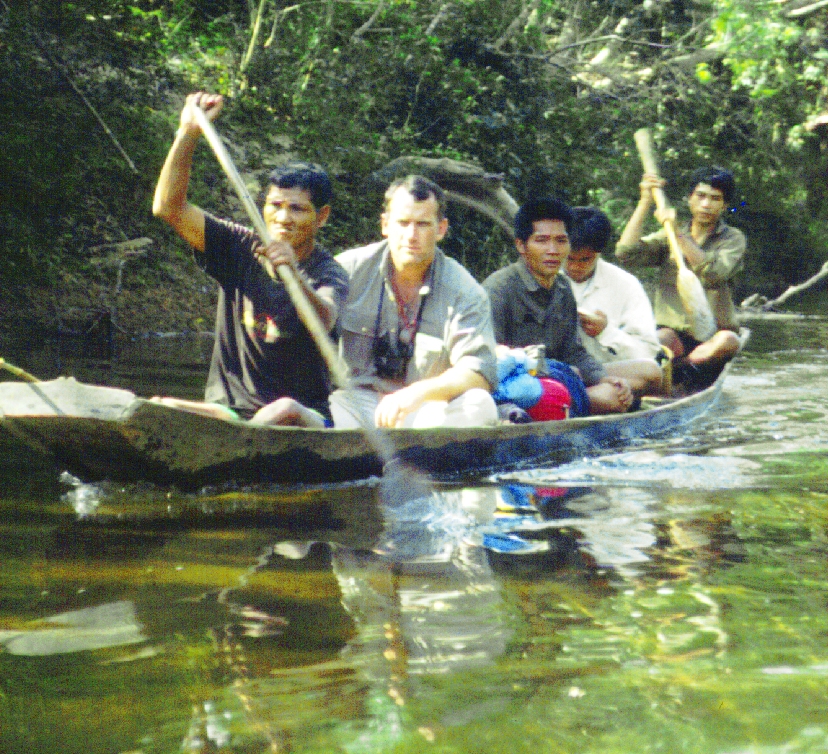‘The Indiana Jones of Wildlife Protection’ at work in the Myanmar jungleWorking, and Speaking, For Animals and Fellow Stutterers
Alan Rabinowitz’s Inspiring Lifelong Journey
By Duncan Strauss
Host, ‘Talking Animals,’ at NPR affiliate station WMNF-FM, Tampa, Florida; online at www.talkinganimals.netAlan Rabinowitz doesn't just seem like a guy I'd like to have a beer with, but one I'd like to grab a brew with daily for as many days as he kept saying "yes" to the invitation. (And the day he finally said "no," he'd probably do it with such gentle, humane aplomb that I'd fail to realize I'd been blown off.)
One of the world's foremost experts on big cats (dubbed “The Indiana Jones of Wildlife Protection” by TIME magazine), Rabinowitz has led such a supremely rich, varied, colorful life in his 56 years that one session over a Bud—or even two or five sessions—wouldn't cover anywhere near all the important conversational ground you'd want to explore, even if those talks were long, and fast.
Indeed, Rabinowitz has been through so much—overcome and accomplished so much—that when you dare to suggest that he may have already lived many of the nine lives reputedly allotted his beloved feline friends, you might well sidestep ClicheVille.
At this point, some of those lives include a long, storied career as a renowned zoologist (he holds a Masters in zoology and a Ph.D. in wildlife ecology), conservationist, and field biologist. Those arguably constitute at least one life, maybe two.
He's the author of a half dozen books (most recently, Life In The Valley of Death: The Fight To Save Tigers In A Land Of Guns, Gold And Greed, issued in paperback this month) and some 80 articles. That's a life, no?
He's discovered not one, not two, not three, but four new species of mammals. That's gotta amount to a life, maybe two. (How many new species have you discovered? Yeah, same here.)
And he's also devoted so much of his time over the years to raising awareness about the disorder of stuttering that this surely adds up to a life. In fact, in what strikes me as a powerfully poignant and exquisite juxtaposition of words, he serves as a Spokesman for the Stuttering Foundation of America. For damn sure, that's a life.
Indeed, all of Alan Rabinowitz's other lives, all of his achievements and triumphs, are rooted in—and clearly driven by—his growing up with a severe stutter. So severe, he's recalled, that the monumental effort to speak, often including spasmodic body movements, prompted his teachers and school officials to conclude that he belonged in special education classes, what his fellow students called the "retarded classes."
For Rabinowitz, this led to isolation, this led to anger, this led to not speaking. And this led to animals. He's recounted in numerous interviews, and his own writings, that, as of second grade, he effectively gave up trying to speak during his childhood and retreated to a world of animals-the pets (turtle, chameleon, lizard) at home, and regularly visiting the Bronx Zoo, where in a bit of fauna foreshadowing, he was particularly drawn to the Big Cat House.
He did speak to these animals, and developed a singular, precocious understanding of the plight of zoo animals, feeling they were in nearly identical circumstances: people mistreated them because they too couldn't communicate, and he vowed that if he were ever able to speak, he'd become their voice. (Succinctly recounting this portion of his bio when a 2008 guest on The Colbert Report famously almost brought Stephen Colbert to tears.)
Rabinowitz has fulfilled that vow, and then some, and in looking at the sweepingly successful career (and multiple lives) he's created in the ensuing decades, it may initially seem counterintuitive that he sounds a note of profound gratitude to that dastardly stutter.
In my Aug. 11 interview with Rabinowitz on "Talking Animals" (it was conducted on the phone; not the face-to-face chat over a beer I'm seeking...), he observed, "Stuttering has been a gift to me in that it has put me on the path that got me to where I am."
Part of where Rabinowitz is these days is President and CEO of Panthera, a non-profit organization—in our on-air chat, Rabinowitz likened it to a think tank—devoted to conserving the world's 36 species of wild cats. Among the public, tigers may rank as perhaps the most high-profile big cat, and they certainly need the most assistance from Rabinowitz and his colleagues at Panthera and beyond:He estimated that while there may be 13,000 tigers in captivity worldwide, the wild counterparts number less than 3000. One of the chief gambits aiming to boost that count, he explained, is the implementation of so-called genetic corridors- parcels of land upwards of 5000-mile long, where tigers can roam freely, with greater protection against deadly elements (human and otherwise) and less risk of inbreeding.
This effort appears to be an elephantine challenge, but Rabinowitz has become something of a specialist at vanquishing challenges. In our on-air conversation, we discussed that Rabinowitz's son, Alex, is a stutterer, a condition with a genetic element that is never cured, but can be mitigated through therapy. He also addressed how markedly different Alex's childhood is, including that the boy sometimes accompanies Rabinowitz to lectures—then ribs his Dad afterward about the number of times he stuttered while delivering the talk.
One thing Rabinowitz and I did not discuss—mainly as a product of running out of time; it certainly wasn't off limits—is that he was diagnosed a few years ago with chronic lymphatic leukemia. He describes in Life In The Valley Of Death how devastated, even immobilized, he was by the diagnosis. For a time, he suspended virtually everything he was doing in his life, including the professional work he had committed to continuing in Myanmar.
Then, Rabinowitz being Rabinowitz, came a pivotal moment—tied to his son watching an old video of Rabinowitz working with jaguars as a young man. This prompted pondering, which elicited epiphany, which gave way to announcing to his wife that he was now ready to return to Myanmar.
Only a fool would bet against Alan Rabinowitz, on anything, including beating cancer. And by now, you've probably not only developed an appreciation for what I mean about the multi-faceted appeal of having a beer with Rabinowitz, but might like to join us. What kind of beer can I get you?
Listen to Duncan Strauss’s interview with Alan Rabinowitz at the Talking Animals websiteCheck out Alan Rabinowitz’s emotional appearance on The Colbert Report
‘In Search of the Jaguar,’ National Geographic, Season 1, Episode 13, aired Dec. 31, 1993: Alan Rabinowitz in search of the elusive and endangered jaguar. This episode was filmed shortly after Rabinowitz was diagnosed with chronic lymphatic leukemia. ‘I have two choices in my life now: I can play it very, very safe, and sit at home, and maybe prolong my life by a few years. Be there for my kids. Or I can be the person who I am and who makes me feel best and be the father I want them to know, but maybe cut my life short with them. Shitty choice.’ 56 minutes.
THE BLUEGRASS SPECIAL
Founder/Publisher/Editor: David McGee
Contributing Editors: Billy Altman, Laura Fissinger, Christopher Hill, Derk Richardson
Logo Design: John Mendelsohn (www.johnmendelsohn.com)
Website Design: Kieran McGee (www.kieranmcgee.com)
Staff Photographers: Audrey Harrod (Louisville, KY; www.flickr.com/audreyharrod), Alicia Zappier (New York)
E-mail: thebluegrassspecial@gmail.com
Mailing Address: David McGee, 201 W. 85 St.—5B, New York, NY 10024
Founder/Publisher/Editor: David McGee
Contributing Editors: Billy Altman, Laura Fissinger, Christopher Hill, Derk Richardson
Logo Design: John Mendelsohn (www.johnmendelsohn.com)
Website Design: Kieran McGee (www.kieranmcgee.com)
Staff Photographers: Audrey Harrod (Louisville, KY; www.flickr.com/audreyharrod), Alicia Zappier (New York)
E-mail: thebluegrassspecial@gmail.com
Mailing Address: David McGee, 201 W. 85 St.—5B, New York, NY 10024



 To contribute to and find out more about Alan Rabinowitz’s Panthera organization, a non-profit dedicated to conserving the world’s 36 species of wild cats, visit the Panthera website, http://www.panthera.org/.
To contribute to and find out more about Alan Rabinowitz’s Panthera organization, a non-profit dedicated to conserving the world’s 36 species of wild cats, visit the Panthera website, http://www.panthera.org/.